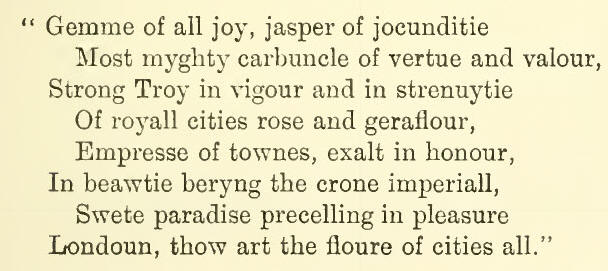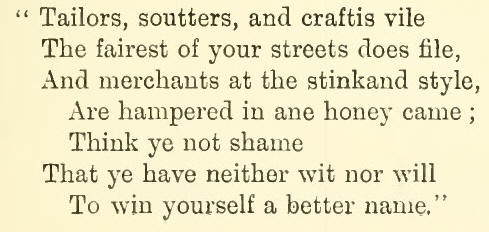|
AT one time there was
probably very little to choose between Scots and English in the matter
of filthiness and general insanitation. In all verity the fastidious
sensibilities of the scornful Howell—who published in 1639 his "Perfect
Description of the People and Country of Scotland "seem to have been
grievously shocked by their experience of so "stinking a town as
Edinburgh"; but not so long before the southern capital might fairly
have vied with Edinburgh in potency and variety of odour. It is certain,
indeed, that even in the palmy times of her uncleanliness the latter
city never boasted such an artery of putrefaction as the Fleet River,
whose effluvia did so clog the neighbouring airs as to assimilate the
incense burnt at the adjacent altars. In Howell's time (and chiefly
under the auspices of King James, born, as he states, "in stinking
Edinburgh'') a good deal had been done for the sanitation of London by
the construction of main sewers; but not more than three years before
the publication of Howell's satire on the Scots—and in simple deference
to the plague of 1636—had the noisome Fleet been bridged and covered in;
and for more than a century after--as is sufficiently attested by her
astounding bills of mortality, London remained a whited sepulchre. But
besides endeavouring to cleanse the outside of the cup and platter, she
gave abundant evidence of a desire to effect a remedy, however unable
from lack of practical skill to do so. Now, Edina ("Scotia's darling
seat"), so far from manifesting any anxiety to be rid of her stenches,
became seemingly only more fondly attached to them as time went by; and
by the middle of the seventeenth century her advance in cleanliness had
only been an advance backwards. Her magistrates bore a bad repute for
their scandalous neglect of her amenities. More than a century before
Howell and his "Perfect Description," Dunbar, in his "Address to the
Merchants of Edinburgh," had inveighed in no measured terms against the
hideous and universal squalor of her streets. Of London he had sung thus
:-

But this is how he
pictures his native capital:-

And even if his rebukes
did for a moment pierce the hides of municipal self-cornp1aceicy and
sloth, it is probable that with the other achievements of his robust and
admirable muse they passed into oblivion at the Reformation, and at any
rate they failed to produce any lasting salutary effect. To such a
hideous pass were matters presently come that in March, 1619, the
Scottish Privy Council found it necessary to represent to the
magistrates that "the city is now become so filthy and unclean, the
streets, the vennels, the wynds, and the closes thereof so overlaid and
covered with middings and with the filth of man and beast, as that the
noble councillors, servants, and others of his Majesty's subjects who
are lodged in the burgh cannot have clean or clear passage and entry to
their lodgings"; and they further give them candidly to know that "this
shameful and beastly filthiness is most detestable and odious in the
sight of strangers, who, beholding the swine, are constrained with
reason to give out many disagreeable speeches against this burgh,
calling it a puddle of filth and uncleanness the like of which is not to
be seen in any part of the world." So that Howell was not by any means
the first to indulge in "disgraceful speeches " against the birthplace
of King James. Nor, if the condition of Edinburgh was even half as vile
as it is painted in this Act of the Scottish Privy Council, is there any
reason to deprecate his satire. indeed there is evidence even to excess
that the Scottish capital, as well as other Scottish burghs, maintained
an equal disregard of the amenities beyond the close of the seventeenth
century. Even after much amendment had taken place as regards the
removal of middens and other permanent centres of putrefaction, it was
very slowly and painfully that her citizens, notwithstanding the
repeated interference of authority, were weaned from the immemorial
custom of paying their nightly orisons to the divinities of the midden
by discharging the daily accumulations of filth from their windows into
the streets.
Without doubt this
peculiar reluctance of the Scot—even him of the "Modern Athens"—to part
with his ancient habit of uncleanliness is traceable in no small degree
to the special bent of his religion at the Reformation. It was said from
of old that cleanliness is next to godliness but if Scottish Puritanism
be the highest possible form of godliness on earth, then cleanliness and
godliness were incompatible for centuries. That rage of iconoclasm which
was a special note in Scottish Reformation zeal was in great part
composed of a frenzy against beauty and art. Cleanliness, if not
promotive of godliness, is certainly necessary to the realisation of
beauty, so that the Scottish reformer was almost necessarily
prepossessed in its disfavour. At least squalor and dirt were thoroughly
antigonistic to adornment and "formosity." Possibly the very fact that
they were disagreeable was reckoned rather a recommendation than not.
That they entailed any evil consequences, whether physical or moral, was
opposed to the general tenor of Knox's teaching and the teaching of
Knox's disciples. Nay, the pest which had scourged the land for
centuries they were so far from regarding as a result of her shameless
uncleanliness, that they especially described it as God's judgment upon
sins of an entirely different character, and Knox himself assumed the
right to prophesy it upon the enemies of the Kirk as one of his peculiar
prerogatives. The endeavours of the secular power to induce the adoption
of cleanlier habits in the towns and burghs were frequent enough; but,
comprehensive as was the authority claimed by the Kirk over manners and
morals, she never indicated the smallest discontent with the national
vice of squalor. In the secular statute-book of Scotland there is at
least one Act (1424) against the wearing of "ragged clothes"; but, while
"excess in apparel " is specially designated in ''The First Book of
Discipline" as one of the sins which "do properly appertain to the
Church of God to punish the same as God's Word commandeth," a
significant silence is maintained as to unkemptness and unwashedness,
and even as to deficiency in clothing. It is even possible that the
assemblage of a whole congregation in "harn gowns" would have rejoiced
the preacher as a peculiar token of the operation of grace, for personal
adornment was persistently discouraged by the Kirk. So that, however
great may he the debt of Scotland to Knox, and however beneficial to her
may in some respects have been his influence, it is to be feared that by
the guidance alone of him or his disciples she would never have obtained
deliverance from the slough of her uncleanliness. |

